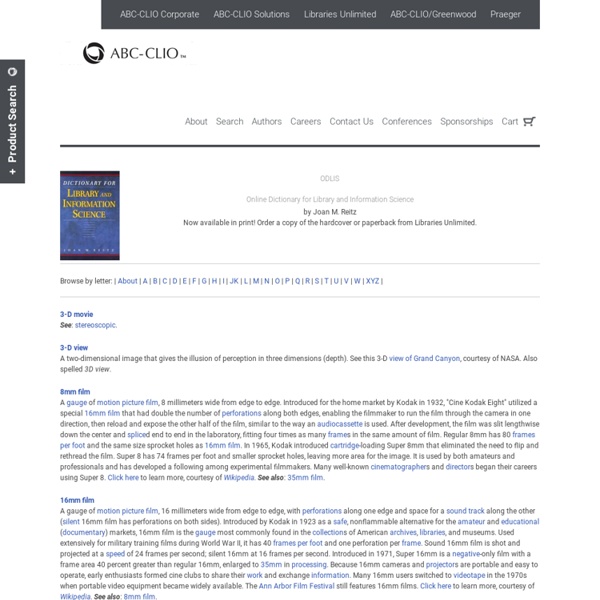Is Google Making Us Stupid? - Nicholas Carr
Illustration by Guy Billout "Dave, stop. Stop, will you? Stop, Dave. Will you stop, Dave?” So the supercomputer HAL pleads with the implacable astronaut Dave Bowman in a famous and weirdly poignant scene toward the end of Stanley Kubrick’s 2001: A Space Odyssey.
About IFLA
Español | français | Deutsch The International Federation of Library Associations and Institutions (IFLA) is the leading international body representing the interests of library and information services and their users. It is the global voice of the library and information profession. Founded in Edinburgh, Scotland, on 30 September 1927 at an international conference, we celebrated our 75th birthday at our conference in Glasgow, Scotland in 2002. We now have 1500 Members in approximately 150 countries around the world.
Information As Thing – Claudia Chui
“Three meanings of ‘information’ are distinguished: ‘Information-as-process’; ‘information-as-knowledge’; and ‘information-as-thing…’” -Michael K. Buckland Even Michael Buckland, emeritus professor at the UC Berkeley School of Information, admits that the irony of the term information is that it “is itself ambiguous and used in different ways”. He seeks to clarify this term by taking ideas of information and organizing them effectively into three categories, or “groupings” as he explains it. And while these definitions often form overlap over that of other categories, it is far more effective to pinpoint similar characteristics to begin to understand and study the idea of information. 1.
Introduction - Codex canadensis
Archived Content This archived Web page remains online for reference, research or recordkeeping purposes. This page will not be altered or updated. Web pages that are archived on the Internet are not subject to the Government of Canada Web Standards.
How library and information science can save the world and why to care - LIBREAS. Library Ideas
Zitiervorschlag Jutta Haider, "How library and information science can save the world and why to care. ". LIBREAS. Library Ideas, 25 (2014).
Linux 101 Hacks eBook, by Ramesh Natarajan
I’m happy to announce the release of the 2nd Edition of my Linux 101 Hacks eBook. This eBook is totally free. There are total of 101 hacks in this book that will help you build a strong foundation in Linux. All the hacks in this book are explained with appropriate Linux command examples that are easy to follow. In the 2nd edition of the book, several small hacks from the 1st edition are consolidated, and several new hacks were added.
Google Flu Trends: A case of Big Data gone bad?
Well, it seemed like a good idea at the time, but sadly Google Flu Trends has turned out to be a prime example of what can go wrong when you read too much into your Big Data… When Google Flu Trends first kicked off back in 2009, the search giant thought it was being rather crafty and had hit on a foolproof way to track outbreaks of influenza around the world. The idea was simple enough – if you get sick, you’ll likely search on Google to find out things, such as how to treat it. Google decided it wanted to track these searches, and use the data to try and predict flu epidemics even before medical authorities like the Centers for Disease Control (CDC) can do. But Google Flu Trends has proven to be anything but accurate, and in fact is often cited for predictions of flu cases that are way off the mark. In 2010, a year after it was born, researchers at the University of Washington stated that the site was around 25 percent less accurate than the CDC.
Understanding ; Data, Knowledge, Information & Wisdom – Karim Vaes
Ever heard of the DIKW pyramid? It stands for the Data / Information / Knowledge / Wisdom pyramid. Sometimes it is also referenced as “DIKW Hierarchy”, “Wisdom Hierarchy”, “Knowledge Hierarchy”, “Information Hierarchy” or “Knowledge Pyramid”. Although it is uncertain when and by whom those relationships were first presented, the ubiquity of the notion of a hierarchy is embedded in the use of the acronym DIKW as a shorthand representation for the data-to-information-to-knowledge-to-wisdom transformation. Data is conceived of as symbols or signs, representing stimuli or signals.
WHO CREATES CONTENT?: Stratification and content creation on the Internet: Information, Communication & Society: Vol 16, No 4
Until the Internet arrived, content creation and distribution was always an expensive, difficult process. With the Internet it is dramatically easier, faster, and cheaper. Some argue that this will move creation out of the hands of elites and lead to wider participation in the public sphere and to enhanced democracy. This paper makes three contributions to this debate.




Dictionary for library science by pepetra Sep 29